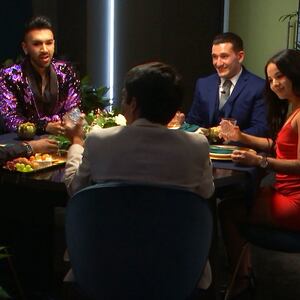As Love Is Blind creator Chris Coelen developed his delightfully bonkers take on the reality dating genre, he had one home in mind: Netflix—and it’s easy to guess why. At this point, reality has become one of the streamer’s best branded strengths. Plus, as Coelen put it, “they encourage some risk-taking.”
But Netflix’s rise to reality primacy is somewhat surprising, given how little interest its executives initially showed in the genre. Speaking at an investor conference in 2015, chief content officer Ted Sarandos said, “The kind of disposable nature of reality basically doesn’t have much of a long shelf life. It hasn’t been a great category for us.” And yet, a year later, the company began experimenting with its own originals in this space. It took a second to crack the formula; early projects, including a MythBusters follow-up, and a tweaked take on American Ninja Warrior, showed promise but lacked a clear brand identity. Then, in 2018, came the hits that solidified Netflix’s reality brand—bubbly shows like Queer Eye and Nailed It.
Despite the (deserved) heaps of praise these programs generated for Netflix, they don’t really reinvent the wheel. And like every traditional network, Netflix has launched plenty of projects that never took off; for every buzzy success, there are several projects that fell flat. But the constant churn of Netflix offerings means the shows that fail are quickly forgotten—making room for experimentation that could prove riskier on networks with a finite amount of programming. Instead, the source of Netflix’s luster in this space seems to come from its relationships with both producers and audiences. Producers love the streamer because of its laissez-faire approach, and viewers enjoy the shows’ slightly more grounded approach to a stereotypically scandalous medium.
Speaking with The Daily Beast, three producers who have worked with Netflix praised the company’s relaxed approach to unscripted production. Next in Fashion executive producer Robin Ashbrook offered a solid theory as to why Netflix operates like this: “When day one began of the Netflix world, it was like, ‘Fuck, we've got to get like 500 shows on air,’” he posited. “Do [you] have the time, if you're a Netflix reality exec, to really micromanage me? No!”
Executives at cable and broadcast networks, Ashbrook said, are just as talented as Netflix execs—“but they are definitely not encouraged to have the same creative freedom to say, ‘Yes, do it.’”
Because those networks produce fewer shows, Ashbrook said, “every fucking decision as to what the graphics look like, and how we shoot it, and what the script is, everything goes through a focus group.” The Circle creator Tim Harcourt echoed that sentiment. “There are a lot of different experiences you can have with a broadcast or cable network, but obviously a lot of them are very old,” he said. “They’ve been around for many years; their work practices reflect that.”
Multiple producers also noted the collaborative working relationship they were able to establish with Netflix executives, particularly unscripted boss Brandon Riegg. “Say things didn’t work out in the show that we predicted would turn out a certain way,” Harcourt said. “There’s no finger-pointing from anyone saying, ‘I told you not to do that!’ Because we all made the decision together.”
It might have taken them a while to hook up, but Netflix and reality television are actually natural bedfellows. After all, reality creators know all about being accused of eating someone else’s lunch. Fears that Netflix could be a “cable-killer” have surrounded the company from the beginning. And although the reality boom of the early aughts excited and scandalized viewers, it also caused tension for the writers, directors and crew who oversaw scripted shows. After all, everyone was competing for a finite number of primetime slots, and reality was cheaper and quicker to produce. Netflix helped upend that traditional limitation. And now it feels somewhat fitting that the streamer has become one of the biggest beneficiaries of a reinvigorated reality scene.
The timing lined up perfectly as well; the mid-2010s were a dire time for reality. At a time when “Prestige TV” had overtaken the airwaves, reality—the genre that had once been considered narrative televison’s biggest existential threat—was pronounced dead, or at least dying. But Netflix’s reality shows, more subtly produced than the average cable or broadcast program, preached joy and empathy at a time when hunger for these things had peaked. (Read: post-2016.) Cut to 2020, and some of Netflix’s biggest debuts for the year have been its unscripted offerings—including The Circle, The Goop Lab, and Love Is Blind.
Beyond their sunny dispositions, these series also share another characteristic, Ashbrook argued: They don’t condescend or overreach. In casting for Next in Fashion, he said, the goal was to find people who were actually good at what they do. “I don't want to name the name of any shows,” he said, “but we all know there are enough cable shows where you go, ‘He’s an incredible character, and looks incredible, and is a soundbite machine’—and Can they do what we're asking them to do? is the secondary question by the casting team.”
“We all know that goes on,” he said. Many great shows are made that way, “so I’m not knocking it.” But he does believe that the Netflix shows’ restraint sets them apart. “At Netflix we assume an intelligence of the audience watching our show,” he said. “We can assume a sense of humor.”
Perhaps the most exciting part of Netflix’s reality game going forward is the international angle. The Circle, for instance, will soon launch its French and Brazilian editions, which Netflix greenlit alongside its American adaptation of the British format. In most cases, international offshoots of popular broadcast properties would not be managed under the same corporate umbrella—but here, they are not only developed simultaneously, but at least in The Circle’s case, overseen by the same person, Harcourt himself. “I think this is probably the first time that anyone's done anything like this,” Harcourt said. (“The Brazilians love to party,” he adds, “so every other episode Elisa [Chalfon, Netflix’s nonfiction series manager in Brazil] would be like, ‘We need to have another party! We need to have another party!’”)
But Netflix’s greatest strength when it comes to reality might not have anything to do with the output. It’s also about the platform itself—which promotes genres of all sorts to all of its viewers. So even those who do not consider themselves reality fans can get a taste. After all, as Coelen pointed out, there’s a reality show out there for everyone.
“I don’t think that there is a ‘reality audience,’” Coelen said. “I think that people like the stories. You might love Parasite and you might also love Love Is Blind. You might like The Irishman and also like The Bachelor. It’s about sinking your teeth into stories… It’s real emotion.”



